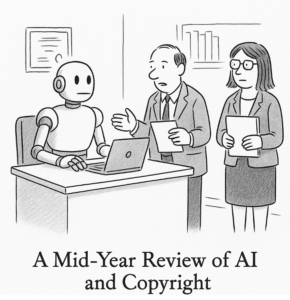
The role of copyright rules in the regulation of artificial intelligence (AI) continues to dominate legal discussions in 2025. With new case law, legislative initiatives, and regulatory developments unfolding across jurisdictions, the dialogue on how copyright interacts with AI models and systems – particularly around training data, authorship, and lawful use – has only grown more complex.
The recent preliminary reference to the Court of Justice of the European Union (CJEU) in Case C-250/25, Like Company v Google Ireland Limited from the Budapest Környéki Törvényszék (Hungary) illustrates this growing momentum (see early commentary by Keller, Guadamuz and Rosati). This reference comes on the heels of national first instance judgments on different aspects of text and data mining (TDM) and/or AI training in the Germany, The Netherlands, Hungary, as well as pending litigation in in France – by authors and publishers against Meta – and in Germany by collecting society GEMA against Suno AI and Open AI. Outside the EU, we can also mention the Getty Images v Stability AI case in the UK, a veritable tsunami of litigation in the US, as well a notable case against OpenAI in India.
As we await guidance from the CJEU in C-250/25, it’s worth reflecting on the rich and diverse commentary published on the Kluwer Copyright Blog so far this year.
Below is a chronological round-up (in reverse order) of our posts from 2025 touching on AI, TDM, and related copyright issues:
June
Copyright, Compliance, and Confidentiality: Finding Common Ground in Generative AI —Enrico Bonadio, Eduardo Alonso and Vansh Tayal (Symbiosis Law School, Pune, India)
Read here
Report on LSE event – Artificial Intelligence, Intellectual Property, and the Creative Industries — Marianna Foerg
Read here
May
The EU’s false sense of isolationism in AI and copyright — Bertin Martens (Bruegel)
Read here
Do AI models dream of dolphins in lake Balaton? — Paul Keller
Read here
From Hollywood to Germany: A Transatlantic Comparison of Collective Agreements on AI in Film and TV Production — Christiane Stuetzle & Susan Bischoff
Part 1
Part 2
Does Human Learning Equal Machine Learning? High Court of Delhi to Rule on Lawfulness of TDM for Machine Learning— Pragya Jha & Bernd Justin Jütte
Read here
Third European Court Decision on the General Purpose TDM Exception Is Out — Peter Mezei
Read here
April
Originality in the Age of AI: How to Get Copyright Protection Now? — Jakub Wyczik
Read here
The TDM Opt-Out in the EU – Five Problems, One Solution — Martin Senftleben
Read here
March
Thaler v. Perlmutter: Human Authors at the Center of Copyright? — Matt Blaszczyk
Read here
Second and Third Drafts of the General-Purpose AI Code of Practice Released — Marianna Foerg
Read here
Remuneration for Use of Works in Text and Data Mining — Damian Flisak
Read here
Navigating User Lawfulness in European Copyright Law: From Lawful Use to Lawful Access — Tatiana Synodinou
Read here
Reconceptualizing the Reproduction Right in the Age of AI — Rita Matulionyte
Read here
Open Source Artificial Intelligence Definition 1.0 – A ‘Take It or Leave It’ Approach for Open Source AI Systems — Yaniv Benhamou & Michel Reymond
Read here
February
European Copyright Society Opinion on Copyright and Generative AI — Dusollier, Kretschmer, Margoni, Mezei, Quintais, Rognstad
Read here
The AI Act Provisions Relating to Copyright – Possibility of Private Enforcement? Germany as an Example— Jan Bernd Nordemann & Arman Rasouli
Part 1
Part 2
January
DPG Media et al. vs. HowardsHome – A National Ruling on DSM’s Press Publishers’ Rights and TDM Exceptions — Etienne Valk & Iris Toepoel
The Dubious Utilitarian Argument for Granting Copyright in AI-Generated Works — Patrick Goold
Read here
As the year progresses, we expect more key developments in this space, including judicial clarification, legislative action, and policy initiatives from global institutions. The Kluwer Copyright Blog will continue to monitor and contribute to the conversation.
Stay tuned for further updates!
